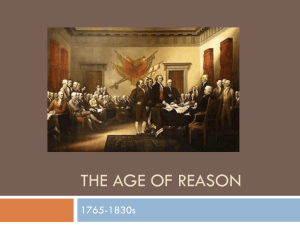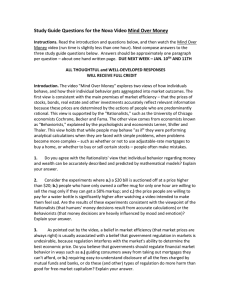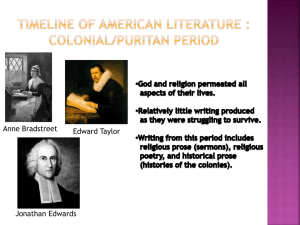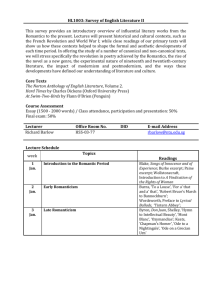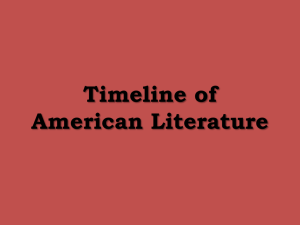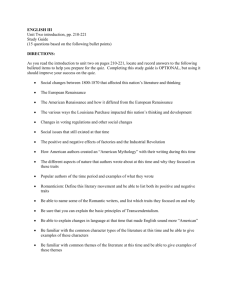Eras in American Literature
advertisement
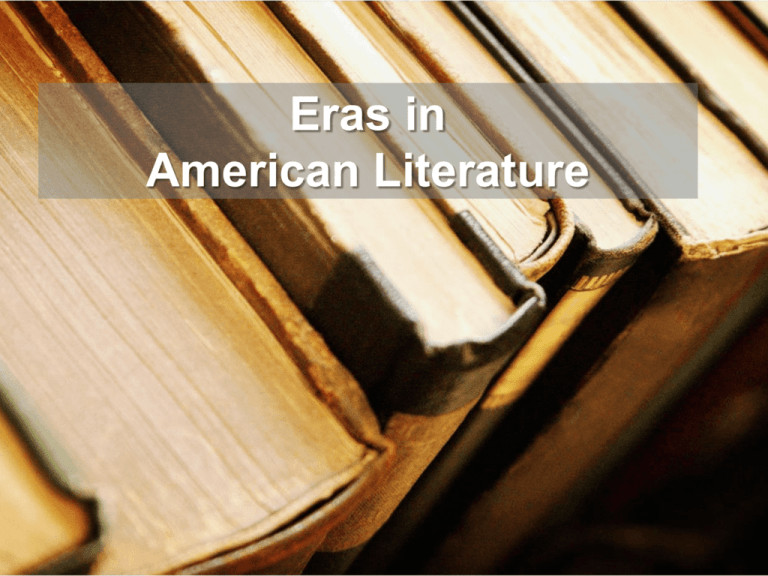
Eras in American Literature Before We Start • Fold your paper into 2 columns • Topic: Eras in American Literature • Label – left column: Q’s, right column: Notes • Summary box at the bottom The Puritans, the Rationalists, and the Revolution •Captain John Smith, charter member of the Jamestown colony, chronicled his new world in a volume known as True Relation –Typical of the style of writing during the early period of America –Concerned more with facts than literary style –Mostly historical •Puritans, band of religious zealots who braved the Atlantic to establish a new order in America –Believed that each person should seek a direct personal relationship with God –Strive to live without sin to ensure a path to salvation in the afterlife –Much of their reading focused on the Bible –Writings tend to be nonfiction historical accounts or diaries that focused on religious observation •Poet Anne Bradstreet •Minister Jonathan Edwards The Puritans, the Rationalists, and the Revolution •Captivity stories –Tales of settlers being abducted and tortured by native Americans –Wildly exaggerated, if not completely fabricated –Fed the colonists’ desire for exciting tales of an exotic new land and their perception of Native Americans as a people to be feared. •The Age Of Reason –Pamphlets and essays influenced popular opinion –Complete faith in human intellect –Valued reason above all –Believed that people were essentially good and capable of creating an ideal society •The Rationalists –Benjamin Franklin –Thomas Paine –Thomas Jefferson Topic: Eras in Am. Lit Q’s • How did Puritan beliefs influence their writing and the society? • In what ways did the Rationalists shape our country? Notes • Puritans – nonfiction historical accounts or diaries focused on religious observation – Jonathan Edwards, Cpt. John Smith, Anne Bradstreet • Rationalists – Reason – People good & able to create ideal society (utopia) – Ben Franklin, Thomas Paine, Thomas Jefferson American Romanticism • Rebelled against the ideas of the Age of Reason • Valued emotion, imagination, and intuition • Found inspiration in nature • The Fireside Poets – Henry Wadsworth Longfellow – Oliver Wendell Holmes – James Russell Lowell – John Greenleaf Whittier American Renaissance •Very different thinking about religion, human nature, and the future •Americans were discussing how best to organize American society –Better public education –End to slavery –Women’s rights •Writers –Nathaniel Hawthorne –Herman Melville –Edgar Allan Poe –Washington Irving –James Fenimore Cooper •Poets –Emily Dickinson –Walt Whitman •Transcendentalists –Ralph Waldo Emerson –Henry David Thoreau –Believed that to live more satisfying life, you had to go beyond everyday reality by immersing yourself in nature –Optimistic, putting faith in the power of the individual –People could be happy and good if they felt a personal connection to nature Topic: Eras in Am. Lit Q’s • Why was nature such an important part of Romanticism and Transcendentalism? • Compare Romanticism to Transcendentalism. Notes • • • Romanticism – Rebelled against Rationalists – Imagination, creativity – Nature – Longfellow, Holmes, Whittier Renaissance – How to organize society – Hawthorne, Melville, Poe Transcendentalists – People could be happy and good if they felt a personal connection to nature The Civil War and Realism •Writings about slavery –1850 Fugitive Slave Act – imposed punishment on anyone who helped a person trying to escape in the southern states –Harriet Beecher Stowe – Uncle Tom’s Cabin –Narrative Of The Life Of Frederick Douglass –The life story of Sojourner Truth –Walt Whitman celebrated the bravery of American soldiers Realists, Regionalists, and Naturalists • Stephen Crane - The Red Badge Of Courage – Tried to describe life as accurately as possible – Lives of ordinary people from a neutral point of view • Henry James – Psychological novel • Fascinated with people’s behavior • Explored thinking and motivation behind the actions of characters • Mark Twain – Adventures Of Huckleberry Finn – Regionalist - focused on the reality of life in specific parts of the country • Jack London – The Call The Wild – Naturalist – focused on the forces of society or nature that are beyond a person’s control but influence life Topic: Eras in Am. Lit Q’s • How did the Civil War affect writing? • Compare and contrasts Realists, Regionalists, and Naturalists. Notes • Civil War – Not much significant literature • Realists, Regionalists, and Naturalists – Focus on reality, forces of nature, and people’s behavior. – Jack London – Mark Twain Modernism •Spirit of changing growth reflected in which of the early twentieth century –The Roaring Twenties •T.S. Eliot , Ezra Pound, e e cummings, and Marianne Moore –Broke from tradition –Modern style that was more impersonal –Used symbolism to a greater degree –Influenced by European modernist artists the •Picasso and Matisse Modernism •The Harlem Renaissance –Explosion in human rights –Migrated to northern cities in the nineteen twenties –Came together to influence each other’s work –Focused on the reality of black life including history, racism, and identity •Langston Hughes •James Weldon Johnson •Countee Cullen •Zora Neale Hurston •Richard Wright Modernism •Following the Great Depression, Americans core beliefs about themselves in the world began to change –The American Dream changed •Americans were cynical but the government •Began to question traditional ways of thinking about politics and culture •Stream of consciousness writers –William Faulkner –Katherine Anne Porter •Influenced by Freud •Psychology •Reality of American life –Sinclair Lewis – small town –Ernest Hemingway – disillusionment with American ideas –F. Scott Fitzgerald – consequences of living the American Dream, questioning societies definition of success and progress •The Great Gatsby Topic: Eras in Am. Lit Q’s • Give an example of the symbolism used by writers in the 20’s. • In what ways did the writers of the Harlem Renaissance change people’s perceptions of African Americans? Notes • Roaring 20’s – Break from tradition – Symbolism – Modernist influence • Harlem Renaissance – Focus on black life, civil rights, racism – Langston Hughes – Malcolm X • Modernism – New American Dream – Stream of Consciousness – Hemmingway, Fitzgerald Great Names in American Literature •Washington Irving •James Fenimore Cooper •Ralph Waldo Emerson •Nathaniel Hawthorne •Henry Wadsworth Longfellow •Edgar Allan Poe •Harriet Beecher Stowe •Henry David Thoreau •Frederick Douglass •Herman Melville •Walt Whitman •Emily Dickinson •Louisa May Alcott •Mark Twain •Henry James •Kate Chopin •Edith Wharton •Stephen Crane •Theodore Dreiser •Willa Cather •Robert Frost •William Carlos Williams •Sinclair Lewis •Eugene O’Neill •Ezra Pound •TS Eliot •Katherine Anne Porter •Zora Neale Hurston •F. Scott Fitzgerald •Ernest Hemingway •Thomas Wolfe •Langston Hughes •John Steinbeck •Robert Penn Warren •W.H. Auden •Richard Wright •Eudora Welty •Tennessee Williams •Ralph Ellison •Arthur Miller •Robert Lowell •J.D. Salinger •Jack Kerouac •Joseph Heller •James Baldwin •Allen Ginsberg •Anne Sexton •Toni Morrison •Sylvia Plath
